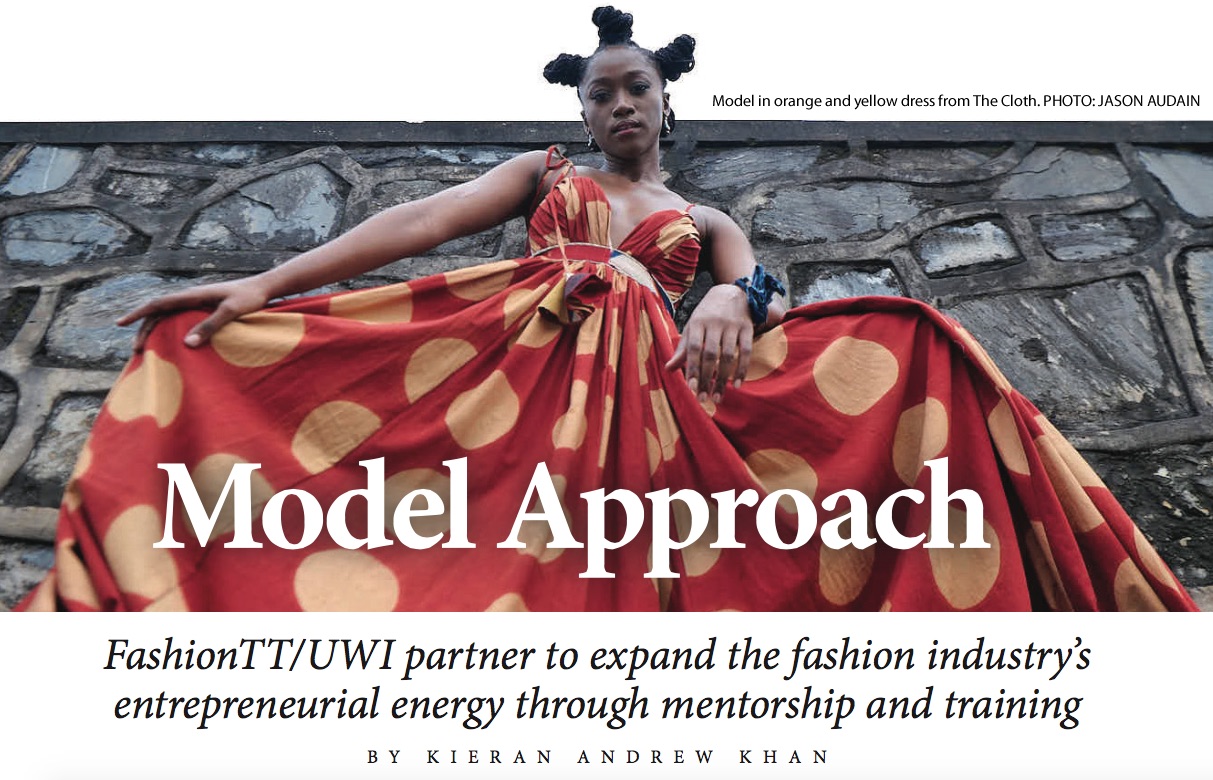
Fashion is a global, multi-billion dollar industry, and creating meaningful growth in the local sector is the work of the Trinidad and Tobago Fashion Company Ltd (FashionTT). The state company is in the fourth year of its Value Chain Investment Programme (VCIP) to deepen the industry's business development and export readiness. And though Trinbagonian creativity is world-renowned, our ability to meaningfully capitalise on our natural creative capacities continues to elude us. A recent partnership between The UWI and FashionTT seeks to change that.
Selected as the business consultant and service provider of the VCIP, the 2022 partnership will allow the university to deploy its programmes and personnel through UWI St Augustine’s Faculty of Social Sciences Business Development Unit (BDU) and Entrepreneurship Unit to impact 170 participants in the FashionTT programme.

Lisa-Marie Daniel, General Manager, FashionTT, welcomes this new era. "We are very excited to be working with The University of the West Indies, a premier educational institution, to execute the three tiers of the VCIP. This programme seeks to improve the business operations of our designers and increase their sales, exports and job employment through it. We also aim to support our designers to build sustainable businesses and an improved standard of life that contributes to the country's economy."
She believes that these goals can align to the benefit of all stakeholders and the country at large. That commitment to the big picture is beginning to pay off.
According to Daniel and conservative estimations by FashionTT, the VCIP and other initiatives have helped to grow the local fashion industry by 35 per cent over the past few years. She notes, the fashion industry is undergoing a strategic renaissance which capitalises on the immense creativity in T&T:
"Since the launch of FashionTT, our designers have been increasing their revenues by as much as 136 per cent and up to TT$1M in a given year in revenues. Designers have also penetrated new markets, including South Korea, France, Fiji, Dubai, Samoa, the United Kingdom, and Australia.”
She adds that in March 2022, FashionTT also launched its Virtual Trade Mission platform for 11 designers in T&T at the top tier of the VCIP. This led to one designer joining Macy's international site and others still under consideration by international buyers.
FashionTT has also worked to solve the production bottleneck by creating Made868, a local production facility, and a fabrication lab for accessories and fabric printing which Daniel calls a “game-changer”.
The UWI's role in continuing the VCIP will be through training, mentorship and consultancy services for the participants in the programme through its business-focused units.
"The BDU and Entrepreneurship Unit are supporting arms of the Faculty of Social Sciences and possess the capacity to work with any entrepreneur, company or entity to help them build their management capacities," Dr Acolla Cameron, Dean of the Faculty of Social Sciences, explains.
"At the core of this FashionTT initiative,” she adds, “is really the entrepreneurial support that the university can provide specifically through the Entrepreneurship Unit. In the last five years, we have been building capacity in that unit in terms of providing mentorship and business start-up support for a number of budding businesses, both on and off the campus. We can leverage our best-in-class practices to adapt to any industry including fashion, and we expect that this partnership is the first of many more to follow. We have designed a system that will allow for knowledge transfer no matter the industry."

Dr Meena Rambocas, Deputy Dean, Planning and Programming, Faculty of Social Sciences, leads the BDU:
"The BDU is geared to support professional development through re-skilling, up-skilling and retooling to help industry stakeholders. It offers a valuable alternative and multiple learning pathways aside from the traditional university learning trajectory. As a result, we have a rich pool of people who have worked in many fields in addition to their lecturing and course administration duties at the university. We have staff members who have worked deeply in the creative and fashion industries, which is why this partnership is a natural alliance to allow the university to do what it does best."
Dr Cherisse Permell-Hutton, Business Development Coordinator of the BDU, adds, "We at the university have the capacity to provide what these types of entities and entrepreneurs require. We deem the MSMEs [Micro, Small and Medium Enterprises] to be very important in moving the economy forward – particularly this creative industry that we consider to be one of the sunrise industries. As a nation, we must reimagine the revenue generators to grow our economy, and we will do everything we can to support that goal."
The Entrepreneurship Unit is led by Programme Manager Julian Henry, who notes that "the creative sector is a key area of interest for the further development of Trinidad and Tobago. Trinis play almost naturally into the sector but struggle with the business component. Our role, as it pertains to FashionTT, is to accelerate learning and understanding of that component. We seek to determine where these brands are in terms of export readiness and position the Trinbagonian fashion brand and also have individual brands that shine through.”
An experienced business coach, he states emphatically that there is no other programme of this nature in the country.
Over the past few years, The UWI has strengthened its support of T&T entrepreneurs through various units, including the creation and development of the St Augustine Centre for Innovation and Entrepreneurship (StACIE) and UWI Ventures. According to Dr Cameron, the units work together as a funnel and overall ecosystem to drive the process from idea to revenue generation.
The partnership with FashionTT represents a new era of public-private cooperation for the university and heralds a renewal of internal collaboration toward the continued development of the economy, in a meaningful and tangible manner.